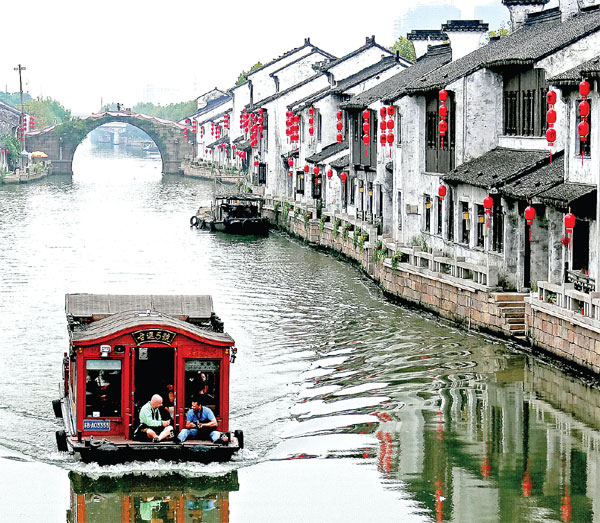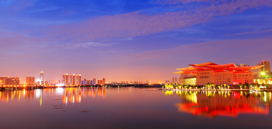Sister-city pacts bring about a variety of opportunities
Updated: 2014-09-14
Ties with foreign cities give Wuxi another channel to seek global resources
Wuxi is building a global sorority of cities.
The economic hub in Jiangsu province has forged 46 sister city relationships in 27 countries on five continents. And it aims not only to develop existing alliances but also to establish new ones.
 |
|
Expats visiting the inner-city section of the Grand Canal. |
Sister-city pacts bring about a variety of opportunities Wuxi's sister city relationship with San Antonio, Texas, won the 2014 Most Innovative Award by Sister Cities International. The affiliation was established in 2012.
"Two years isn't very long," said Chen Minghui, director of Wuxi's foreign affairs office and president of its association for friendship with foreign countries.
"We won the award because, during the two years, we've made many active exchanges."
These exchanges have focused not only on economics but also on architecture, environmental protection and urban planning.
Sister-city pacts bring about a variety of opportunities
"We've sent many working groups," added Chen.
And many people from San Antonio have visited Wuxi.
Other strong relationships include those with Germany's Leverkusen, Japan's Akashi and South Korea's Ulsan.
"We're now looking for high-ranking cities in Malaysia and Indonesia," said Chen. In addition to engaging with Malaysia's Ipoh and Indonesia's Surabaya, Wuxi's representatives are planning trips to Russia, Turkey and Romania to discuss possible ties.
Wuxi hopes such links will help it to develop in areas such as culture, tourism and sports - especially youth sports, with an emphasis on soccer and table tennis.
Sports exchanges are already strong with cities in Japan and South Korea.
Wuxi's tourism industry has benefited from the global linkups.
The 88-meter-high Lingshan Grand Buddha - one of the world's largest - draws 1 million followers during the annual World Buddhist Forum.
Turtle Head Park also attracts about 1 million visitors a year from home and abroad.
Wuxi hosts a sister cities forum every year.
"A specific focus area is economic cooperation," Chen said.
"We've made progress, especially in Europe, through relationships with Denmark, Finland and Germany."
Other areas on which Wuxi focuses include education, science and technology, healthcare and social management.
The city has also started an internship program that involves sending three to five staff members to live and work in Japan. It has similar programs in Ireland and Switzerland.
While the thrust of most of Wuxi's sister city relationships is economic or technical, the city is hosting and staging overseas a growing number of cultural events.
Quorum Ballet performed a new version of Swan Lake to mark the 20th anniversary of the relationship with Portugal's Cascais.
And a Finnish orchestra performed in Wuxi's grand theater in 2012 to celebrate the second anniversary of the city's relationship with Lahti.
What does a sister city mean? Some cultural ties, not much else, as the answer usually is from many cities. But it means a lot for Wuxi. It sees enormous resources from its sister-city programs.
"Our objective is to enhance the quality of sister city relationships and expand these relationships, especially with cities that have high-level industry and state-of-the-art technology," said Chen, the director of the municipal foreign affairs bureau.
Xu Ruiyi, Chen's deputy, explained: "We look for cities with similarities with ours, from which we can learn a lot, so much so that we can make our city a better place to live, or cities that complement our weakness in industries."
After Akashi, Japan, became Wuxi's first sister city in 1981, hundreds of Japanese businesses came to Wuxi in the 1980s and '90s.
In the past 30 years, Wuxi has sent 44 research students to Akashi to learn such skills as infrastructure construction, road administration, agricultural technology, finance, environmental protection, gardening and disaster prevention. Most of those students now work for the Wuxi government in key roles.
Sister cities Leverkusen, Germany; Sodertalje, Sweden; Kortrijk, Belgium; Hertzogenbusch, the Netherlands; San Antonio, the United States; and Ulsan, South Korea are all strong in equipment manufacturing, electronics, new materials, chemicals and energy.
There are regular exchanges between them and Wuxi, which help Wuxi upgrade its industrial structure and pursue innovation-driven growth.
The chief of protocol and head of international relations of the city of San Antonio, Sherry Dowlatshahi said: "We determined that our match in China should align with certain strategic industries in San Antonio to encourage mutual economic growth and development. These industries include biomedical, manufacturing, technology transfer, tourism and green development."
Wuxi's prominence in Jiangsu province is also a great advantage for San Antonio. "Many of our missions to China follow a regional approach, all of which incorporate Wuxi now as a base," Dowlatshahi said.
Some sister cities in developing countries have become popular with Wuxi businessmen as well. Sihanoukville, a port city in Cambodia, has been an ideal investment target in Southeast Asia in the past 20 years.
Wuxi's active participation in sister-city cooperation also spills over to large-scale collaborations involving more parties.
San Antonio and Wuxi discussed Wuxi's interest in engaging in Mexico in 2012. San Antonio played a liaison role for Wuxi with its long-term partner, Puebla. The three cities share an interest in the automotive industry and San Antonio has leveraged its close proximity to Mexico to cultivate a beneficial trilateral relationship and exchange.
Tel:0510-81178873
E-mail:haiyulu@163.com


